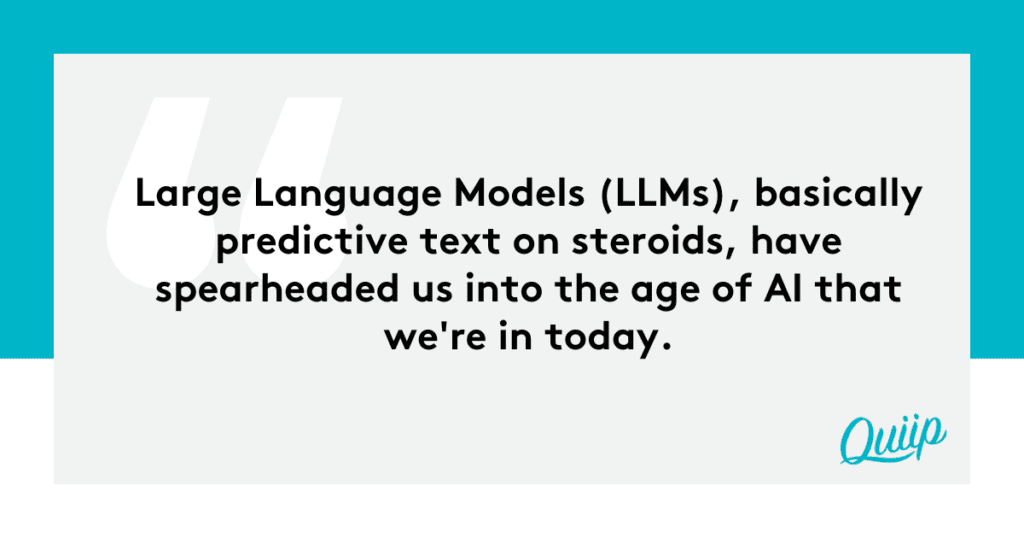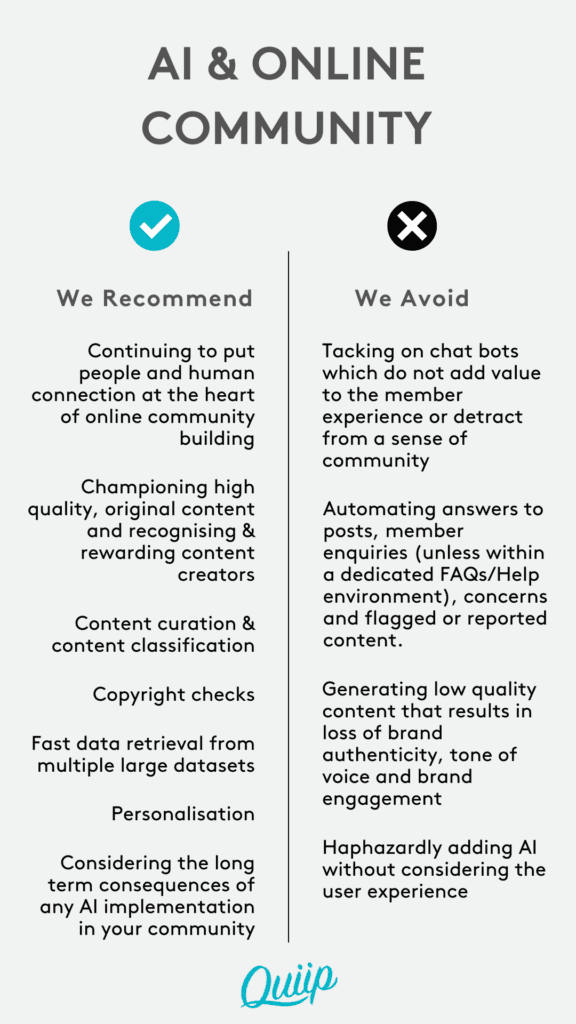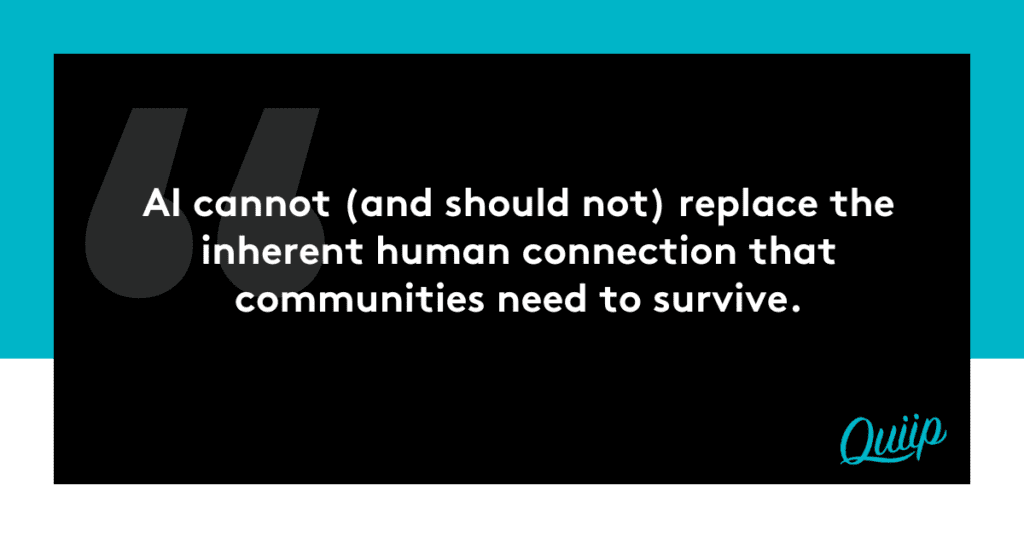Artificial Intelligence and Community Management
As Generative AI continues to take the digital world by storm, Quiip investigates when and where it can be used in the community management pipeline.
What is AI and Generative AI?
Artificial intelligence (AI) is essentially the ability for machines and software to perform the functions we usually associate with human intelligence. Generative AI, the type of AI that can produce content, has been around in some shape or form since the 1960s. The formation of Large Language Models (LLMs) in 2018 – basically predictive text on steroids – spearheaded us into the age of AI that we’re in today. The use of AI in online communities is increasing, not only for content creation, but also for moderation and dialogue.
AI’s explosion in popularity is largely due to ChatGPT, an artificial intelligence chatbot developed by Open AI and released free to the public late last year. ChatGPT was trained through extensive private and public data, enabling knowledge across a wide range of topics. Development continues on the application and on-going data collection from users further trains the service, meaning that results are ever changing and, in theory, becoming more accurate.

What are the ethical considerations?
While there are many benefits to using AI, it’s important to consider the ethical ramifications. Many AI applications have been trained using scraped data, forgoing consent from original creators on the use of their work. This creates complexities around intellectual property and copyright. While the law is still catching up to the legalities of using copyrighted works in AI creations, AI tools do not currently have a legal status and cannot own copyright (read more about this in our further reading section below).
The authenticity and quality of user-generated content is also at stake. Schools and universities are currently grappling with the impact of AI on student assessments both in policy and practice. While in online communities, Quiip is seeing growing instances of AI-generated content submitted as user-generated content. AI content detection tools remain a developing area. We also don’t know the future impacts of increased AI reliance on human cognitive skills and behaviours.
Another key ethical consideration is AI’s ability to utilise a small, specific data set to mimic content. This opens the door for scammers, trolls and bad actors to employ AI for data phishing, identity theft, cyber-abuse, bullying and defamation using deep fakes and intricate scamming techniques. Protecting community members from the malicious use of AI is something that should be considered as part of community risk and governance.
Finally, AI may generate inaccurate advice and information. The creation and sharing of information, lacking in factual evidence, can lead to the spread of misinformation and disinformation, with potentially dangerous or detrimental societal impacts. Verification of information will increasingly become an important role of community managers as LLMs evolve.
Ethical concerns have not slowed down the advancement of AI use in the tech world. With ChatGPT proving to be both popular and profitable, companies including Microsoft and Google have accelerated their use of AI despite the lack of regulations around its use.
What does AI mean for community management?
AI is rapidly integrating itself into many industries including community management. Businesses and organisations will need to consider the opportunities, risks and ethical considerations.
Microsoft recently introduced Azure AI which specialises in monitoring both imagery and text, Unitary and Clarifai are using AI tools to assist with content moderation and community platforms such as Discourse are introducing AI plug ins. Social media marketers are using tools such as ChatGPT to generate ideas and content, and AI-integrated design software is becoming increasingly sophisticated enabling image and video production.
Here’s where we’re championing the use of AI in online community and some areas to avoid:

Some of the areas we remain concerned about:
- Inherent bias based off the data the AI has trained on.
- Cultural considerations not being taken into account and potential to perpetuate societal biases including discrimination.
- Current limitations in interpreting multiple signals (i.e. copy and visual assets) and placing them in context.
- Can contribute to the generation and amplification of misinformation and fake news.
- Privacy and security.
- Lack of legal frameworks and regulation.

While there are advantages to using AI in community management, Quiip stands firm in our belief that AI cannot (and should not) replace the inherent human connection that communities need to survive. Where AI is implemented, humans should be working in tandem to ensure the best outcome for communities. Without human interest, creativity and ingenuity within a community, members won’t feel valued and will engage less. This will be compounded by increasing volumes of misinformation and disinformation. Quiip predicts that in a world of increasing AI, human verification and authenticity will become increasingly important commodities. It’s important to start thinking about how you can fold verification and authenticity into your community now.
Quiip’s Key Take-outs on AI & Online Community
- Revisit the “why”; the purpose of your online community and the value it is creating.
- Unregulated AI has concerning ethical ramifications spanning copyright, plagiarism, unconscious bias, scams and fraud.
- AI has the ability to make our jobs as community managers easier, but it needs to be considered with long-term impacts in mind. There is potential for AI in communities to worsen the member experience and do irreversible damage to community health.
- AI can learn off very small datasets but if these datasets contain biases or misinformation, these will permeate negatively through your community. Human intervention is necessary to ensure the culture of your community is maintained.
- At their core, communities are about human connection. If we lose that through the use of AI, we have no community.
AI and its use in online community is rapidly changing. While we are experts in community, we aren’t experts in AI and acknowledge that our recommendations are likely to change as best practice use in online community evolves.
Further reading
Artificial Intelligence and Copyright
Risk of extinction by AI should be global priority
TIL: ChatGPT Doesn’t Want Your Community Jobs
Want to know more? We’re always happy to chat AI and Community. Get in touch and book a call with our team!
